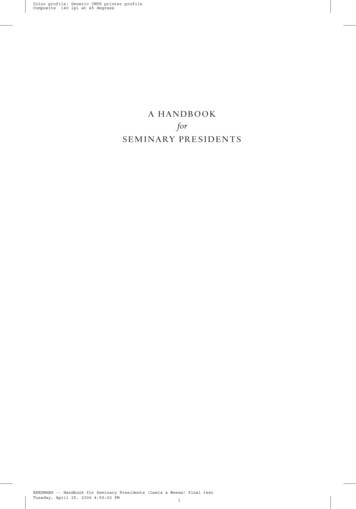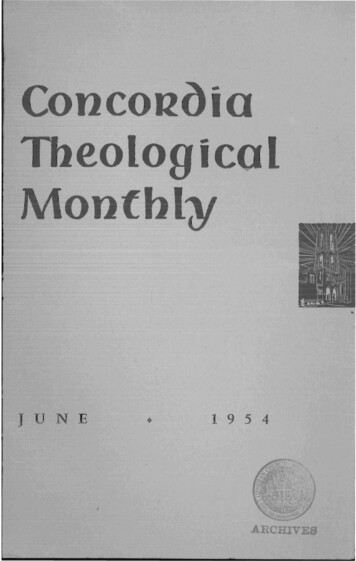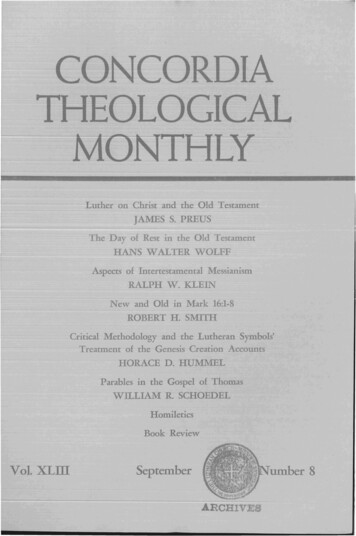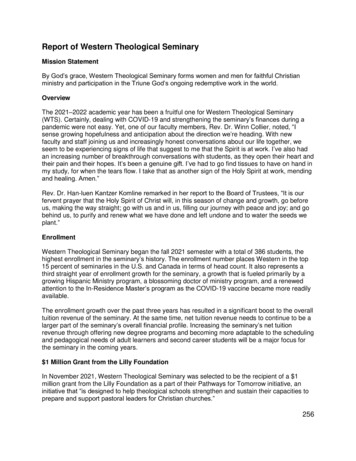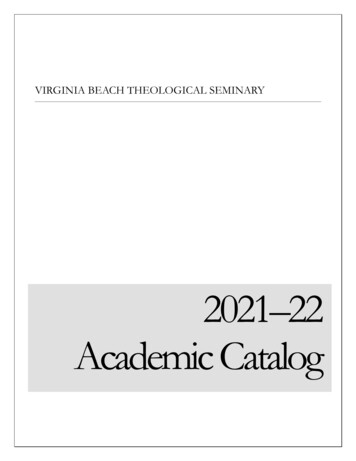
Transcription
Concoll()iaTheologicalMonthlyAUGUST· 1959
The Word of the Lord GrewThe Historical Character of theNew Testament WordBy MARTIN H.FRANZ MANNEDITORIAL NOTE: This article is the first chapter of the author's forthcomingbook in the area of New Testament Introduction.THE Word of the Lord grew" -three times in the Book ofActs Luke uses this sentence to sum up a period of thehistory of the first church (Acts 6:7; 12:24; 19:20). Thesewords are a telling expression of the Biblical conception of thedivine Word. Our Lord Himself compared the Word to a seedthat is sown and sprouts and grows: "The seed is the Word of God"(Luke 8: 11 ) . The Word of the Lord is a power and is active;it "prevails mightily," as Luke puts it in one of the passages justreferred to (Acts 19:20). Paul speaks of the Gospel as "bearingfruit and growing" (Col. 1: 6), and Peter speaks of the "living andabiding Word of God" as an "imperishable seed." (1 Peter 1 :23)This "living and active" Word (Heb. 4: 12) is therefore a forcein history; it "speeds on" in the world and "triumphs" there( 2 Thess. 3: 1 ), in time and place and among men; it is enmeshedin events, tied up with the world, and it involves people. TheWord of God is action; for God is not a lecturer but the Godwho is "working still," as Jesus said of His Father and of Himselfthe Son (John 5: 17 ). God is the Lord of all history, revealsHimself by His mighty acts in history, and the Word which Hegives His prophets to utter interprets those acts and makes theman enduring force in the world. His Word and His work are soclosely connected that both the Old Testament and the New Testament speak of God's great acts simply as the activity of His Word.Psalm 107, which praises the LORD as the Deliverer from all evils,describes His act of delivering those who "because of their iniquitiessuffered affliction . and drew near the gates of death" with thewords, "He sent forth His Word and healed them, and delivered563
564THE WORD OF THE LORD GREWthem from destruction" (Ps. 107: 17 -22). And Peter in his sermonin the house of Cornelius can sum up the whole story of thesending of the Son of God into the world thus: "You know theWord which He [God] sent to Israel, preaching good news ofpeace by Jesus Christ." (Acts 10:36)If, then, we are to hear the divine Word of our New Testamenton its own terms (and that is the whole task and function ofinterpretation), we must study it historically. We must learn tosee it as the growing and working divine Word, as God Himselfactive in history. We must come to know it and comprehend itas a word that has its point of origin (as a divine word) in humanhistory, as a word that gets its form and its contours from history,as a word that is essentially history (a recital of "the mightyworks of God," Acts 2: 11 ), and as a word that has history-makingpower, as a dynamic and creative personal power of God at workamong men.Students of comparative religion tell us that the Book of Actsis unique in the history of religions. Nowhere else in the religiouslife of man do we find this sober and religious sense of history,this absolute conviction that God is the God of history, whoclothes Himself in a garment of mighty deeds in order to revealHimself to men, the conviction of faith that His Word is a force,is in fact the force in history. The Book of Acts is therefore uniquelyvaluable for our study of the whole New Testament. It is valuablebecause it provides us with the historical information which isindispensable for reconstructing the historical background of manyNew Testament books, especially the letters of Paul. But not onlyfor that reason; we appreciate and value the Book of Acts as students of history, of course; but we are never merely historianswhen we seek to interpret the New Testament - we are alwaysfirst and foremost theologians and believers, for whom the historical is a means to a higher end, the end, namely, that we hearthe New Testament speak to us as the living voice of God now.And it is to the theologian and believer that the Book of Acts isreally uniquely valuable. Since it is the history of the first church,conceived of and told, not as the history of another religious societybut as the history of the growth, the progress, and the triumph of
THE WORD OF THE LORD GREW565the divine Word, the Book of Acts can determine not only themethod of our study but also the basically religious attitude ofour study.Thus the first twelve chapters of the Book of Acts will provideus with the materials which enable us to reconstruct the historicalsetting and the original function of the Epistle of James and willgive us an insight into the genesis and the background of themission to the Gentiles which gave rise to the letters of Paul;but we shall do well to use these twelve chapters first as a meansof getting a basic, theological insight into the character of theNew Testament Word of God. This does not mean that we ignorethe historical; it does mean that we see in history the revelationof God, our God. "When my love walks, she treads upon theground," a poet once said in appreciation of a lady who was less"heavenly" than the lady-loves of more exuberant poets. We mightsay the same of our God: "When our God walks, He treads uponthe ground." He does not remain a remote and shadowy sort ofphilosopher's God; He condescends to enter history and does Hisgracious work there, for us men and for our salvation. If we studyhistorically the life of the first church and the nature of theapostolic proclamation which called that first church into being,we shall be enabled to hear God speaking to us now.ITHE LIFE OF THE FIRST CHURCHA. The New People of God Under the Lordship of Jesus ChristWhat sort of life was this life of the first church, that life whichwas the historical framework of our New Testament, the seedbedin which it sprouted and grew? Its first and most obvious characteristic is that it is a life wholly dominated by the Lord Jesus Christ.Luke makes it very plain that the book of Acts (which is the secondbook of a two-volume work of which his Gospel is the first) is thedirect continuation of the Gospel of Jesus Christ: "In the firstbook . I have dealt with all that Jesus began to do and teach"(Acts 1: 1). The human figure of Peter may loom large on thestage of history in the first part (chaps. 1-12) and that of Paul
566THE WORD OF THE LORD GREWin the second (chaps. 13-28); but they are both dwarfed by, andcompletely subordinated to, Him who is the real and sole Actorin tL'lis Book of Acts, this Jesus who continues to do and to teach.It is His Word that grows and speeds and triumphs here, notPeter's or Paul's, a fact which Peter and Paul are the first to assert.His Word grows; His will is done. For He is the exalted Lordof invincible majesty, the Lord who has been "taken up" intoheaven, to the world of God (Acts 1: 2; 1: 9; 1: 11 ), "exalted atthe right hand of God" (Acts 2:33) as "Leader and Savior" (Acts5:31), the "Lord of all" (Acts 10:36). The dying Stephen praysto this Lord, just as Jesus Himself had on the cross prayed to HisFather. (Acts 7:59,60; d. Luke 23:34,46)He is the exalted Lord by virtue of His resurrection from thedead: "This Jesus God raised up. Being therefore exalted atthe right hand of God. . . . God has made Him both Lord andChrist" (Acts 2:32,33,36). It is the God who has raised Himfrom the dead, who has exalted Jesus as Leader and Savior at Hisright hand (Acts 5 :30,31). "God raised Him on the third dayand made Him manifest" (Acts 10:40). The exalted Lord is theLord risen from the dead; that ties Him firmly and forever to theLord who was made man for us men and for our salvation, to theLord Jesus who went in and out among His disciples, whom Johnthe Baptist heralded and proclaimed (Acts 1 :21,22), the manJesus of Nazareth whom God attested to Israel with mighty worksdone in the midst of the men of Israel (Acts 2:22), the Jesus ofNazareth whom God anointed with the Holy Spirit and withpower, who went about doing good and healing all that wereoppressed by the devil. (Acts 10: 38 )He is Lord because He went that way of gracious ministry tothe utmost; He is the Chief Stone of the new temple of Godbecause He was the Stone rejected by the builders (Acts 4: 10,11),because He was betrayed by His own disciple, arrested by His ownpeople (Acts 1: 16) , and killed and crucified. (Acts 2: 23; 3: 13-15;4:10; 7:52)The new people of God know and proclaim their Lord as theServant of God; the term "Servant" is used more frequently ofHim in these early chapters of Acts than anywhere else in the
THE WORD OF THE LORD GREW567New Testament (Acts 3:13,26; 4:27,30; d. 8:32,33). No othersingle term could, perhaps, so fully denote His peculiar and allencompassing Lordship as this one. For with this term Jesus wasproclaimed as the fulfillment of those prophecies of Isaiah whichfixed the hope of God's people on the Servant of the LORD, thatservant whom the LORD endowed with His Spirit for a missionof merciful ministry to all nations in order that He might be"a Covenant to the people" Israel (that is, that He might bringabout fully and forever the intent of God's covenant-mercy andcovenant-fidelity for God's chosen people), and in order that Hemight be "a Light to the nations" - that in Him the dawn ofGod's great day of salvation might break on all men everywhere(Is. 42: 1-9). The Servant is described by the prophet as goingdown into the depths of humiliation and rejection in His ministry(Is. 49:4, 7; 50: 6), a ministry whose goal is the restoration ofIsrael and the salvation of all nations, that the LORD'S "salvationmay reach to the end of the earth" (Is.49: 6). The Servant ispictured by the prophet as going through ministry and humiliationto a triumphant exaltation:Behold, My Servant shall prosper,He shall be exalted and lifted up,and shall be very high . . .kings shall shut their mouths because of Him. (Is. 52:13, 15)But the triumph is not His until He has gone the downwardway of ministry to the full, not only "despised and rejected by men"(Is. 53: 3) but bruised and put to grief by the LORD Himself(Is. 53: 10), who numbers Him with the transgressors (Is. 53: 12)and lays upon Him and punishes in Him the iniquity of all (Is. 53:5, 6) . Only when the Servant has gone down into a vicarious,penal, atoning death for a sinful people, only when He has bornethe sins of many, led like a lamb to the slaughter for their guilt,only then does He rise to new life and triumph (Is. 53 : 11, 12).With the term "Servant" the apostles and the new people of Godafter them could sum up the whole glory of their Lord; the gloryof the ministering Messiah, the crucified Messiah, the risen Messiah,the exalted Messiah were all comprehended in that term; and thedark mystery of His cross was illumined by it.
568THE WORD OF THE LORD GREWThe prophet had said of the Servant:When He makes Himself an offering for sin,He shall see His offspring, He shall prolong His days;the will of the LORD shall prosper in His hand;He shall see the fruit of the travail of His soul and be satisfied.(Is. 53:10, 11)The Servant-Messiah of the new people of God is anythingbut a mere memory for them; He is for them no departed hero,no commemorated martyr. He is their present, living, and activelyworking Lord. Peter tells the people, "God, having raised up HisServant, sent Him to you first, to bless you" (Acts 3:26). We cansee this actively-blessing character of the church's Lord clearly inthe way in which Luke speaks of His "name" in Acts; for the"name" of God in Biblical language means God turned toward men,God entering into communion with man, God making and shapingman's history; so also the "name" of the Lord Jesus Christ signifiesthe Lord in action. If a miracle is done "in the name" of theLULU )C"U", ,; J.cLd says to the lame ,, au aL L H. :;:',, ,, .ltiful Gateof the temple, "In the name of Jesus Christ of Nazareth, walk"(Acts 3: 6), that means: the Lord who in the days of His fleshwent about doing good is still graciously and omnipotently at workin the world; the Author of Life is restoring God's ruined creationto full and whole life (Acts 3:15,16; 4:10; 9:34). Men mustcall on the name of Him whom God has made both Lord andChrist if they would be saved (Acts 2:21,36); they are summonedto repent and to be baptized in the name of Jesus for the forgiveness of sins (Acts 2 : 38 ); for everyone who believes in Himreceives forgiveness of sins through His name (10:43). In JesusChrist, through His active grace in Baptism and the Word, menare saved from judgment (Acts 2:40), brought to God, reconciled,forgiven, made members of the new people of God. Salvation isin His name and in His alone (Acts 4: 12), for He is God's ownroyal and lavish grace in person; He is the present kingdom ofGod; when Luke says of Philip that he "preached good news aboutthe kingdom of God and the name of Jesus Christ" in Samaria(Acts 8: 12), he is not implying that Philip's preaching had twothemes (Philip had but one theme - "he proclaimed to themChrist," Acts 8: 5) but is describing the one theme of his preaching
THE WORD OF THE LORD GREW569in two ways. "The name of Jesus Christ" is another way of saying"the kingdom of God." Where the Lord Jesus is at work, thereGod Himself is at work establishing His royal reign of graceamong men.The exalted Lord works in history, through men. Men are His"instruments" (Acts 9: 15 ), whom He chooses in sovereign grace the persecutor Saul must bow before that royal grace and carrythis Lord's name "before the Gentiles and kings and the sons ofIsrael" and must suHer for the sake of that name (Acts 9:15,16).He makes men His apostles, messengers who are determined whollyby the will of the Sender and are completely dependent upon Him,wholly obedient to Him. As such they speak His Word andrepresent Him and confront men with Him. The apostles' deedsof power are therefore the Lord's deeds; "many wonders and signswere done through the apostles" (Acts 2:43; 5:12). Concerningthe lame man whom he had healed Peter tells the rulers, elders,and scribes, "By the name of Jesus Christ of Nazareth, whom you H,,- fied, " "Vm Gu ialsea wm the: uead, by Him [his man isstanding before you well" (Acts 4: 10). Perhaps the most strikingexpression of the fact that the apostle is the "chosen instrument"of the Lord Jesus Christ (no less than that but also only that)is in the words which Peter spoke at the bedside of the paralyticman at Lydda: "Aeneas, Jesus Christ heals you" (Acts 9: 34).As instruments of the Lord the apostles are completely selfless:"Why do you stare at us, as though by our own power or pietywe had made him walk?" Peter says to astounded people in Solomon's portico (Acts 3:12). And when Cornelius fell down atPeter's feet, Peter responded with, "Stand up; I, too, am a man"(Acts 10:25,26). It is because the apostles are the self-effacing,chosen instruments of the Lord, because they are no more and noless than the human vehicles of the Lord's presence, that their wordshapes and directs the whole life of the new community: "Theydevoted themselves to the apostles' teaching." (Acts 2:42)The apostles are not religious geniuses, whose insights entichand enlarge the accumulated religious stores of mankind; they arerecipients of revelation, witnesses to a Person and an act in history - and this Person and this act completely overshadow anddominate them. They are important, not for themselves but for
570THE WORD OF THE LORD GREWwhat they bear witness to. They receive divine power for onepurpose only, for witnessing (Acts 1: 8). In fact, the Lord mustcompletely invert their own human thinking before He can usethem as chosen instruments. They are curious as to times andseasons, and they think of a reign in Israel: "Lord, will You at thistime restore the kingdom to Israel?" (Acts 1: 6); he turns theirthoughts from curiosity as to times and seasons to a sober submission to the sovereign will of the Father, from the idea of reignto the duty of ministry, from the narrow horizon of Israel to thewide world. They are to be His witnesses, not only in the landand among the people they know and love, but also to the Samaritans whom they hated, and to the ends of the earth, the wideworld of the Gentiles, about whom they were by nature indifferent(Acts 1: 8 ) . The Lord sets them to witnessing to Jew and toGentile, for He is Lord of all (Acts 10:36) and determines allhistory. The eighth verse of the first chapter of Acts not onlyindicates the plan of the Book of Acts; it marks out the courseof all history for the church, until the time when the Son of Manreturns to end and judge and crown all history.Thus the life of the new people of God is a life under theLordship of Jesus Christ; the men upon whom God's new dayhas dawned behold "the light of the knowledge of the glory of Godin the face of Christ," as Paul puts it (2 Cor.4:6). But they beholdthe glory of God; the Lordship of Jesus does not obscure God butreveals Him; the name of Jesus is the revelation of the kingdomof God (Acts 8: 12; d. 28:31); to be under the Lordship of Jesusis to live a life in communion with God.The same history which reveals Jesus as Lord and Christ revealsGod the King as the gracious and omnipotent Lord of history.God foretold the coming of His Christ, His anointed King, "bythe mouth of all His prophets" (Acts 3: 18; 4: 25, 26) . Godattested the man Jesus of Nazareth with mighty works and wondersand signs (Acts 2: 22 ); God anointed Jesus with the Holy Spiritand with power, God "was with Him" (Acts 10:38). When Jesuswent down in death at the hands of His enemies, God was stillin control; they crucified and killed Him "according to the definiteplan and foreknowledge of God" (Acts 2:23); when they wroughttheir rebellious will upon God's Servant, they were still doing what
THE WORD OF THE LORD GREW571God's hand and God's plan had predestined (Acts 4:27). God, wehear it again and again, raised Jesus from the dead (Acts 2: 24;3: 15; 10: 40); God exalted Him on high and glorified His Servant(Acts 2:33; 3:13; 5:31); God has ordained Him to be Judge ofthe living and the dead (Acts 10: 42). The exalted Christ hasreceived from the Father the promised Holy Spirit, whom He poursout upon His own - and that Spirit moves men to tell of "themighty acts of God" (Acts 2: 11 ). The persecuted and prayingchurch bows before God as the absolute and sovereign Lord ofhistory, whose enemies cannot but do His will. (Acts 4:24-28)The church which submits itself wholly to God as the Lord ofhistory (4: 29,30) also adores Him as Creator; the church's prayerbegins, "Sovereign Lord, who didst make the heaven and the earthand the sea and everything in them" (Acts 4: 24) . When Godsent His Son into the created world, into history, into humanity,He was speaking an unmistakable Yea to His very good creation;and not only the prayer of the church but the whole life of thechurch is witness to the joyous conviction that "everything createdby God is good" (1 Tim. 4:4). The witness of the church does notpass over or seek to minimize the full humanity of Jesus, His veryhuman history, His sufferings, His death. Moreover, the new community did not withdraw to a wilderness asylum but stayed andworked and witnessed where the Creator of the world and the Lordof history had placed them. And there was nothing sequesteredor monastic about their fellowship; their fellowship was a tablefellowship; "they partook of food with glad and generous hearts,praising God" (Acts 2: 46, 47); it was a fellowship of familiesthey broke bread from house to house (Acts 2: 46), a fellowshipfrom which woman was not excluded (Acts 1: 14; 6: 1; 8: 3),a fellowship in which woman played a rich and honorable part,as the example of Tabitha shows (Acts 9:36-41). A commoncare for the physical needs of the community was an importantpart of the church's life from the beginning (Acts 2:44,45; 4:32-35); the apostles did not permit it to encroach upon or overshadow their prime task of prayer and the ministry of the Word,but they did recognize its importance and made provision for itas a work which only the Holy Spirit could enable a man rightlyto do. (Acts 6:1-6)
572THE WORD OF THE LORD GREWThese men knew God the Creator as the Father of the LordJesus Christ and therefore as their Father toO; they knew Himas men living under the heaven of the forgiveness of sins. Thistransformed their lives and gave them a remarkable freedom fromcare and anxiety; it gave them "glad and generous hearts" (Acts2:46); it enabled them to welcome suffering in their lives asanother good gift from the Creator's hand (Acts 5 :40, 41). Itfilled their lives with the music of prayer, which accompanied allthat they did and all that befell them (Acts 2:42; 4:24-30; 6:4;12:5,12). It set them free for love toward one another, so that"the company of those who believed were of one heart and soul,and no one said that any of the things which he possessed was hisown" (Acts 4:32). It was no wonder that people felt a certainawe for them (Acts 2:43; 4:21; 5:13; 5:26); they lived liveswhich were an enacted doxology to God the Father of our LordJesus Christ.The church has rightly called our New Testament, the bookwhich incorporates the Word that grew on this soil, "The NewTestament of Our Lord and Savior Jesus Christ"; for it is the bookwhich on every page calls Jesus Lord and gives to men the lightof the knowledge of the glory of God in the face of Christ. Butit is for that very reason the book of the Holy Trinity, for in itJesus is called Lord to the glory of God the Father. And the NewTestament is a book of the Holy Spirit too, an inspired book.This brings us to the second major aspect of the life of the firstchurch.B. T he New People of God Under the PQ1ver of the SpiritThe Book of Acts has aptly been called the Gospel of the HolySpirit. The book opens with the promise of the Spirit (1: 5, 8), andthe New Testament church is born when the Spirit is given in thefullness and universality which neither the Old Testament peopleof God nor the disciples of Jesus had as yet experienced (Acts2: 1-42). The disciples knew the Holy Spirit from the Old Testament as the creative personal Presence of God which makes andshapes and interprets history, the Power which moved over theface of the waters at creation (Gen. 1: 2 ); the Power that cameupon the judges of Israel (Judg.6:34; 14:6) and upon Israel's
THE WORD OF THE LORD GREW573kings (1 Sam. 16:13, 14) and enabled them to do great things forthe LORD and the LORD'S people. They knew the Spirit as thePower that enabled the prophets to say, "Thus says the LORD" to interpret history as the arm of the LORD laid bare and toforetell what the lord would yet do for the salvation of Hispeople and all nations (Acts 1:16; 4:25); they knew that whenthe Children of Israel resisted the leaders and prophets sent tothem by God, they were resisting the Holy Spirit (7: 51); theyknew that the Spirit of the LORD was to rest upon the MessiahPrince of the line of David and enable Him to establish God'srule of right over His people and to restore God's ruined creationto the peace of Paradise (Is. 11: 1-10), that the Spirit of the LORDwould come upon the Servant-Messiah and make Him the Covenantof the people and the Light to lighten the Gentiles (Is. 42: 1;61: 1); they knew that Jesus of Nazareth had been anointed byGod with the Holy Spirit and had thus performed the mightyworks which attested Him as Messiah and Savior (Acts 10: 38 ) ;they knew that it was "through the Holy Spirit" that their risenLord had given commandment to His chosen apostles (Acts 1: 2) .They had received the promise of the Spirit for themselves fromHim, both in the days of His flesh (Luke 12:12) and in the fortydays after the resurrection (Acts 1: 5, 8). But it was not until theDay of Pentecost had come that they experienced what their Lordhad promised, what the prophet Joel had foretold for the last days(Acts 2: 16, 17), the "pouring out" in unprecedented fullness ofthe Spirit of God upon "all flesh."The twelve apostles received the Spirit (Acts 2:4; 4:8; 5:32;10: 19; 11: 12) and Paul, the apostle "untimely born" (1 Cor. 15 :8)received the Spirit, too, in peculiar fullness and strength; but whatthey received was not given to them to have and to hold as theirprivate possession and prerogative; they were not only recipientsof the Spirit; they also became vehicles of the Spirit (d., e. g.,Acts 2:38; 8:18). The Spirit is poured out, not only on apostlesbut also on prophets like Agabus (Acts 11: 28), on the Seven andon evangelists (Acts 6:3,5,10; 7:55; 8:29,39); on great andkindly leaders like Barnabas (Acts 11: 24), on all believers (Acts2:38; 4:31), on Jews, on Samaritans (Acts 8:15-18), and even
574THE WORD OF THE LORD GREW(to the amazement of some Jewish Christians) on Gentiles. (Acts10:44,45,47; 11:15)The Spirit filled the whole church; and the Spirit animated andgoverned the whole life of the new people of God. It is not onlyin ecstatic utterance and in enraptured vision that the Spirit's working is manifested, though these are found in the life of the firstchurch too: the men who spoke in other tongues at Pentecost wereso far carried beyond the way of normal and ordinary speech thatmockers could call them drunken (Acts 2:12); when the Spirit"fell" on the men of Samaria, the results were so striking thatSimon the sorcerer wanted to purchase the power of the Spiritfrom the apostles - it seemed to him a very potent kind of magic(Acts 8: 17-19); when the Spirit fell on Cornelius and his friendsat Caesarea, they "spoke in tongues," in ecstatic doxology (Acts10:44-46; 11: 15 ). Stephen "full of the Holy Spirit" saw "theheavens opened and the Son of man standing at the right hand ofGod." (Acts 7:55,56)But Luke's record attributes to the working of the Holy Spiritutterances and actions which our secularized thinking would consider ordinary and normal. Not only the enraptured Peter ofPentecost is filled with the Holy Spirit; the Peter who must speakin sober defense before the Sanhedrin is no less Spirit-filled (Acts4: 8) - as his Lord had promised, the Spirit teaches him in thathour what he ought to say (Luke 12: 12). The Spirit is for theapostles functional power, a power which equips them for theirtask of witnessing to the act of God in Christ, to the fact in historythat spells the salvation of mankind (Acts 1:8; 5:32; 9:17,20).The Spirit is working guidance for the apostle (Acts 10:19) andfor the evangelist (Acts 8: 29,39). When the Spirit inspires theprophet Agabus, he produces no startling and exciting apocalypticnovelties to satisfy the religious curiosity of man; he foretellsa famine, in order that the church may carefully plan and dulycarry out her work of charity (Acts 11: 28-30). The Spirit enablesmen to "serve tables" in the church, to provide for the widow andthe fatherless in wise and sober charity; the Seven chosen for thistask must be, Peter tells the church, "men . . . full of the Spiritand of wisdom" (Acts 6: 1-6). The martyr's vision of the openedheavens is not the only fruit of the Spirit in the life of Stephen,
THE WORD OF THE LORD GREW575one of these seven men; the Spirit enabled him to do his workas servant of the church for the poor and to acquit himself wellin his disputes with the men of the synagog. (Acts 6: 10)The church prayed in her hour of need (Acts 4:23 ff.), prayedfor courage to endure persecution, not for escape from persecution.God manifested His presence among them: "the place in whichthey were gathered together was shaken, and they were all filledwith the Holy Spirit" (Acts 4: 31 ). What is the fruit of the Spirit,what is the result of this inspiration? The result is characteristicof the whole piety of the first church under the power of the Spirit;the aim and goal of its religious life is not self-enrichment orself-fulfillment; there is no trace of egotistical piety here. Theresult is the will to unity and the will to witness: "They spokethe Word of God with boldness" (Acts 4:31). The word whichwe are forced to translate with "boldness" is the outstanding characteristic of the Spirit-filled church in action. It signifies thatfree, glad, courageous confidence, that robust health of faith whichcomes from the assurance of free access to God the Father givenin Christ by the Spirit. It is the energetic religious health whichmakes Peter and John say, "We cannot but speak of what we haveseen and heard" (Acts 4:20); it is that high confidence of faithwhich makes Saul, when he has received the Holy Spirit (Acts9: 17), proclaim Jesus as Son of God in the synagog "immediately"(Acts 9: 20 ), "preaching boldly" both in Damascus and in J erusalem. (Acts 9:28,29)This boldness is boldness under the Lordship of Jesus; it is thechurch which walks "in the fear of the Lord" which enjoys the"comfort of the Holy Spirit" (Acts 9: 31 ) . It is a boldness underthe reign of God, who gives His Spirit "to those who obey Him"(Acts 5:32). This disciplined and obedient character of thechurch's boldness is especially apparent in the church's use of theOld Testament. As Jesus in the days of His :flesh was led by theSpirit, not beyond Scripture but into it, so that He repelled Satanwith "It is written" (Luke 4: 1-13 ), so the apostles were led intoScripture by the guidance of the Spirit. They used the Old Testament gladly and freely, in the confidence that in it God was byHis Spirit speaking to them there and then in their own day;they appropriated it fully as their book, the book of the New
576THE WORD OF THE LORD GREWTestament people of God. Peter's sermon at Pentecost is typical;"the man is crammed with Scripture" is Luther's comment on it.And when Philip, prompted by the Spirit, joined the Eunuch whowas reading from the prophet Isaiah, he "opened his mouth, andbeginning with this Scripture, he told him the good news of Jesus"(Acts 8: 35 ). The Spirit-filled church under th
book of a two-volume work of which his Gospel is the first) is the direct continuation of the Gospel of Jesus Christ: "In the first . Christ" (Acts 2:32,33,36). It is the God who has raised Him from the dead, who has exalted Jesus as Leader and Savior at His right hand (Acts 5 :30,31). "God raised Him on the third day
![Concoll i(] Theological Monthly - ctsfw](/img/20/saleskaourenglishbible.jpg)

